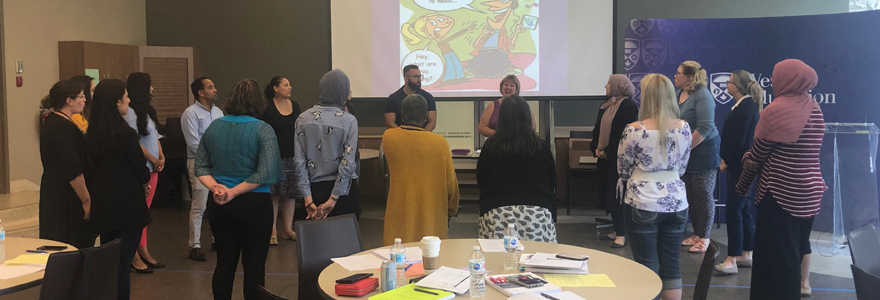
Thursday, July 18, 2019

The Vulnerable Youth project team welcomed 18 members from the London Cross Cultural Learner Centre (CCLC), Windsor Women Working with Immigrant Women (W5) and Muslim Resource Centre for Social Support & Integration (MRCSSI) on Wednesday, July 17 for a Healthy Relationships Plus Program Enhanced (HRPP-E) training. Each of the three newcomer agencies will be piloting the HRPP-E program with newcomer youth within their respective organizations.
The HRPP Enhanced program is an adapted version of the HRPP original program – a small groups, community-based program that builds social and emotional competencies and reduces violence and related risk behaviours. The program teaches skills such as communication, how to give an apology, help-seeking for oneself or a peer, responding to peer pressure and safety planning.
“I am excited about the possibility of having a newcomer version and learning from the expertise in the room,” says Susan Dale.
The Enhanced version is adapted for vulnerable youth and youth in the justice system. This version includes trauma-informed adaptations, additional high-risk scenarios and a harm reduction approach, enhanced information about dating violence and safety planning, as well as teaching about consent and addressing sexual exploitation.
CCLC, W5 and MRCSSI will facilitate the program with several newcomer youth groups over the next number of months. This will give participating youth and facilitators the ability to share their experiences and feedback to understand if the program should be adapted further to better fit the needs of newcomer youth.
This training and notion to adapt the HRPP-E program for newcomer youth is part of larger project objectives to explore the feasibility in developing evidence-informed gender-based violence prevention/mental health promotion programs for vulnerable youth. The Centre for School Mental Health received $5 million over five years to evaluate and/or develop effective programming for high-risk youth, LGBT2Q+ youth, Indigenous youth and newcomer youth. The investment by the Public Health Agency of Canada is part of Canada’s Strategy to Prevent and Address Gender-Based Violence.
More to come…